Captain Beefheart & The Magic Band
Royal Albert Hall, London
1972-03-27
Lineage: AUD>tape (unknown gen)>WAV (using Wavelab)>FLAC (level 8, using Trader's Little Helper)
Tracks:
01. Hair Pie: Bake III (0:55)
02. The Mascara Snake (0:20)
03. The Mascara Fake (0:24)
04. The Mascara For God's Sake (0:48)
05. When It Blows Its Stacks (4:38)
06. Click Clack (4:56)
07. Grow Fins (4:51)
08. Hobo Chang Ba (2:53) instrumental
09. Peon (2:45)
10. Abba Zaba (4:21)
11. Alice In Blunderland (4:45)
12. Frownland (2:08) bass solo
13. Spitball Scalped A Baby (3:12) cut
14. More (1:57)
15. My Human Gets Me Blues (4:06)
16. Steal Softly Thru Snow (3:37) instrumental
17. Golden Birdies (1:52)
Total length: 48:28
Quality: 6.5/10. Taper stopped the recording between the songs several times>I removed the gaps and smoothed the transitions between the songs. Also lots of clicks and further gaps within the tracks>again removed as carefully as possible. Hiss reduction using equalizer. Altogether: 6 hours work, damn.
Line-Up:
Captain Beefheart/Don Van Vliet: vocals, sax, harmonica
Rockette Morton/Mark Boston: bass guitar, guitar
Oréjon/Audi Hon/Roy Estrada: bass guitar
Zoot Horn/Rollo Bill Harkleroad: guitar, slide guitar
Winged Eel Fingerling/Elliot Ingber: guitar, slide guitar
Ed Marimba/Art Tripp: drums, percussion
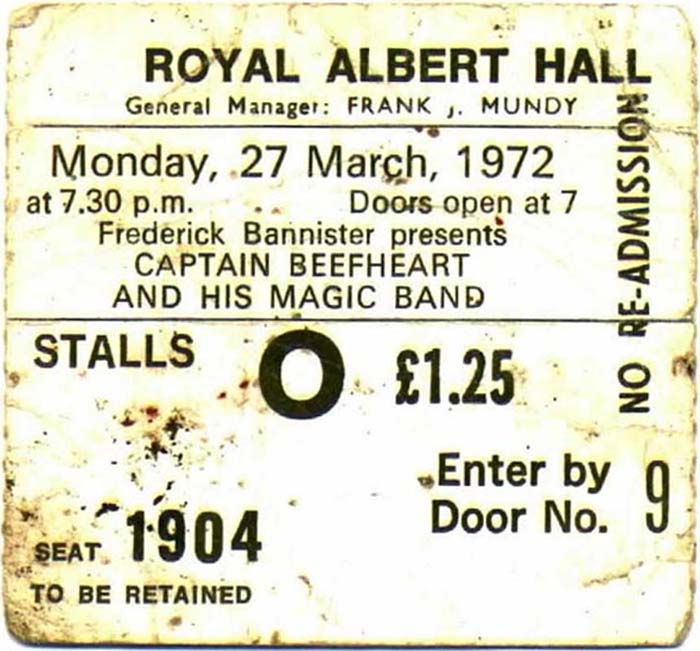
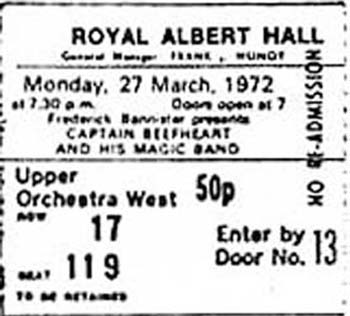
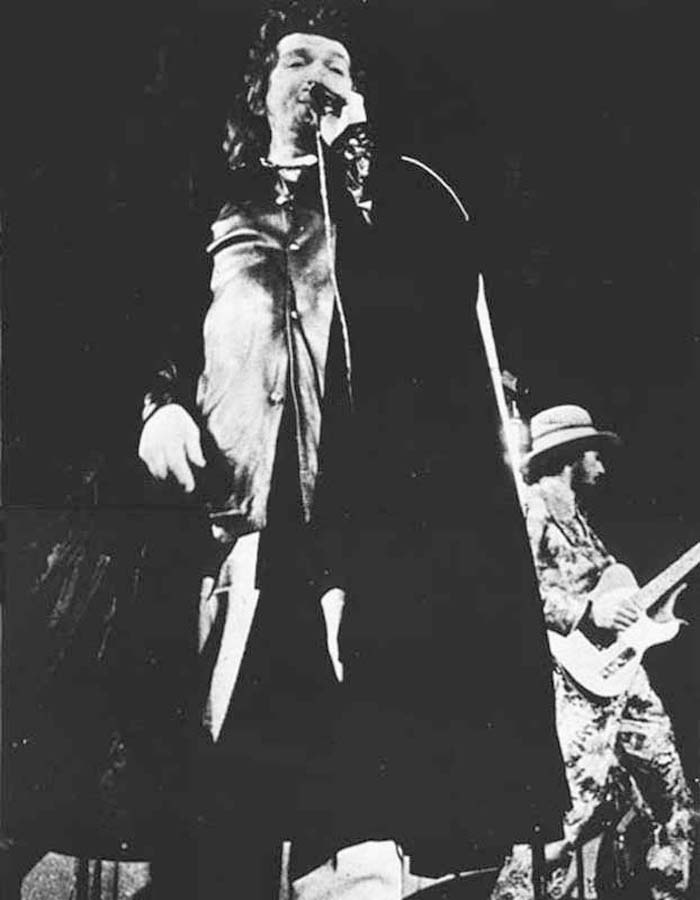
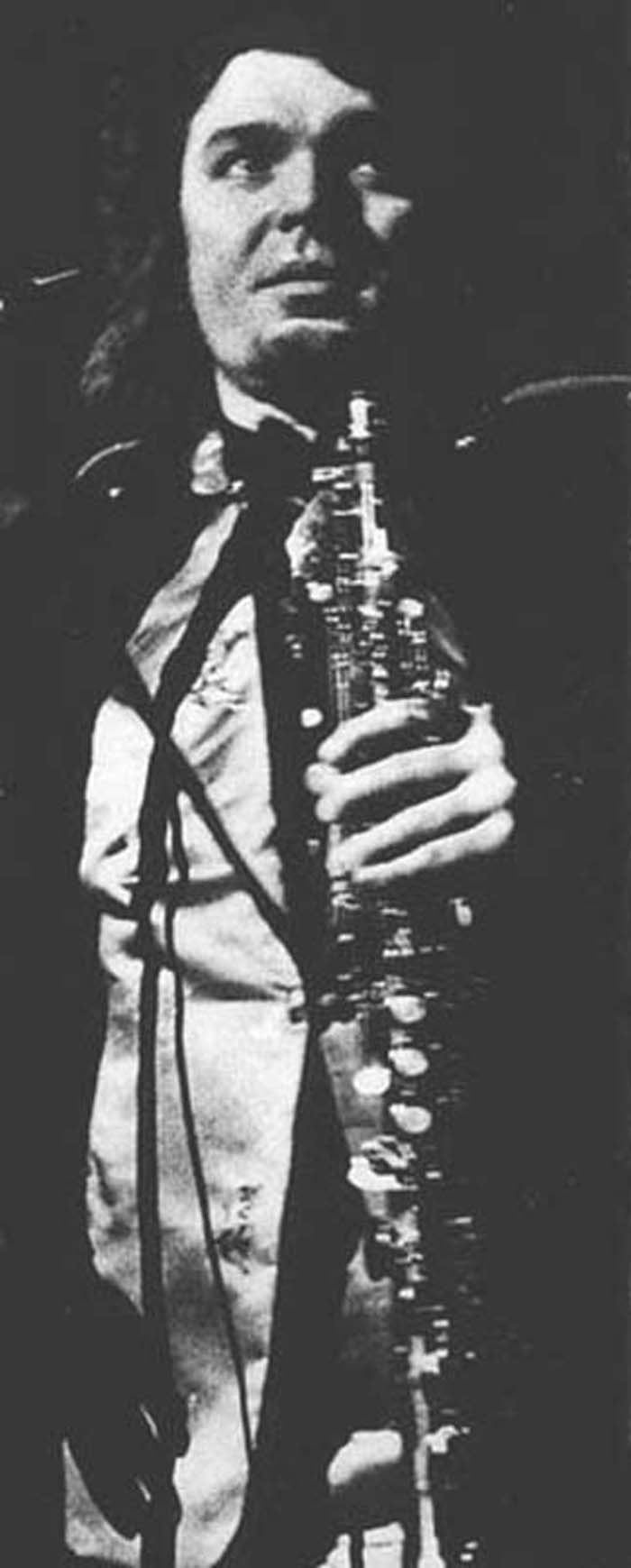
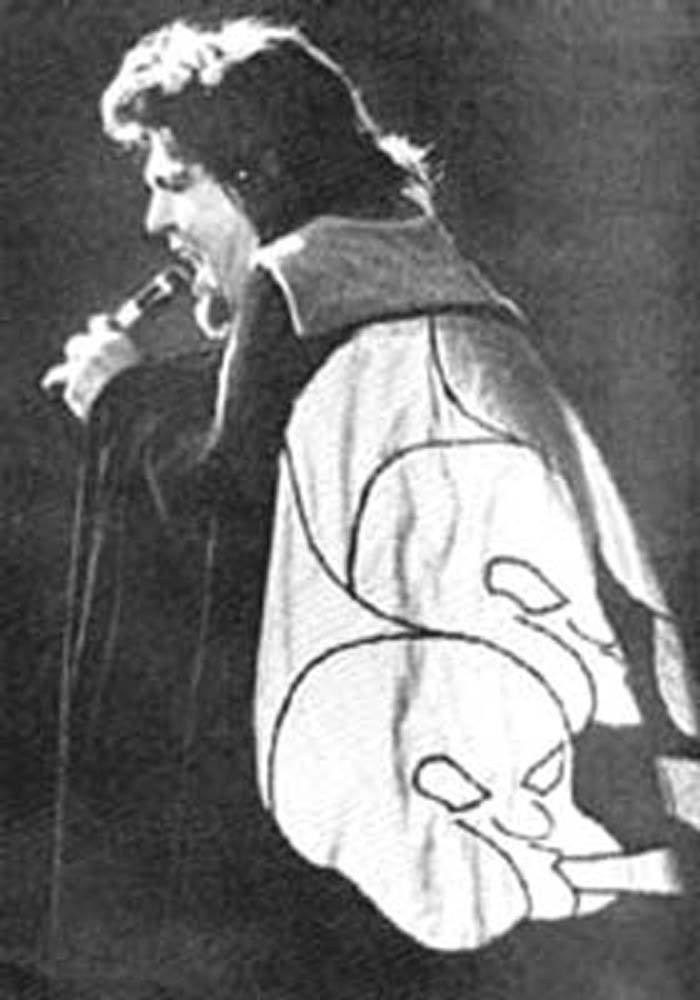
Comments:
Melody Maker cover: Captain Beefheart and his Magic Band booglarised a packed Royal Albert Hall London, on Monday evening, and ended his show with a 10-minute encore. The Captain doesn't usually hand out encores.
The some occurred at Bristol last week where Beefheart opened his first British playing tour since 1968. Apologizing for his weak sound system, the Captain said "I am genuinely sorry about this. I really am." But he carried on regardless - things like that don't seem to disturb him too much. "I don't take things like that too seriously," he said.
Michael Watts: A MAN with a bass guitar, white suit and hat to match, suddenly lopes from the darkness and onto the stage, plucks aggressively at his instrument and prowls around the speakers like Groucho Marx meets the cost of West Side Story. Finally he stops and tells us he's going to smoke a cigar - twice. This is Rockette Morton.
There shambles into the spotlight a catatonic figure that looks as if it stopped by while sleepwalking. He plays something like a washboard. He scrapes this thing once. This is Ed Marimba. He plays drums.
The man emerging in the lustrous pinky orange suit with the furry black and white cape looking like a tubby Billy Butlin, is The Cap, short for The Captain, Captain Beefheart alias Don Van Vliet.
He walks front stage, lifts the microphone, cups it in his hands with his harp, and blows and sings Click Clack. For the next five minutes a train choogles and clatters around the old hall its wheels powered by The Magic Band, its whistle shrilling from the fingertips of Zoot Horn Rollo's guitar. This is the beginning of a performance to savour - Captain Beefheart plays the Albert Hall.
Beefheart live is legend made flesh. Some legends are best kept under wraps for fear the mysterioso quality should look threadbare under the spotlights. This isn't one of those.
Van Vliet is truly a monumental figure in contemporary music. For once the talent equates the image. At the Albert on Monday night one could only marvel at his magnificent voice with its four-and-a-half octave range, that progresses from a subterranean growl, through a stentorian bellow to a falsetto hiccup - a voice of such amazing power that the Albert's difficult acoustics were mastered and cowed in frightening fashion. His music is a sort of blues exotica. The bassist is R and B, but he has restructured the form, imposing discordant, fragmented rhythms that are linked to wild, enigmatic imagery. The music is as truly surreal in its spellbinding fascination as looking at one of those vaguely sinister Dodo objects, like the cup made of fur. Irritating almost in the way it rubs against the nerve-ends, but as if it contains all the secrets of the universe if you only knew the key.
With the Captain everything is strange. "A psychiatrist," he sold at one point, "is someone who wants to die in your other life." It's one of his Beefheartian pieces of epigrammatic wisdom. There's a pause after each song introduction, then The Magic Band spills out its rhythms on cue. They've all been totally immobile whilst not playing, now they jerk around the stage like metallic puppets, motivated by some unseen power.
Zoot Horn, a tall, thin figure, bobs and weaves on his heels; Marimba's arms, which seem to be unnaturally long for a human being, splay outwards and Roy Estrada, the old Mothers bassist, shifts rhythmically from one foot to the other. Rockette grouches over his bass. Winged Eel Fingerling, the second guitarist, looks almost natural, just shuffling around. But none of it seems quite lifelike.
Beefheart, although not a guitarist himself, is said to have taught his band how to play each note of his music. They mesh with such absolute precision that it's frightening. And yet after a time one hopes they would play just one straight lick to break that formulaic perfection. Of course, they never do.
When they finally left the stage and the audience yelled for more, the Captain came back and did just that. He whistled the theme of More. Weird scenes indeed.
(Michael Watts: A Legend Comes To Live. Melody Maker. April 1, 1972)
Bill Harkleroad: One of the few gigs I can definitely remember from this time was at the Albert Hall in London. I almost couldn't relate to it because the place was packed. I don't know how many people the place holds 3,000 or something like that - but I'm looking up at three balconies high and they're packed! We were used to opening up for bands like Jethro Tull, but on this occasion we were the headliners and for some reason that just didn't fit with what we were doing, having that many people in front of us.
At that point we used to open the show with When It Blows Its Stacks which was one of our stronger songs. It was this E 'pa-chunkchunk' type tune, pretty simple actually. I was waiting to start the number from behind the curtains and I made the horrible mistake of not checking to see if my amp was on! The roadie, Danny, hadn't checked either. So anyway, I ran out from behind the curtains and just as they're announcing, "Here's Captain Beefheart and the Magic Band!" I go to hit this big fat E chord - and there's no sound! All of a sudden I become little Billy from Palmdale, California - feeling about 2ft 9' tall and thinking about my mommy because I've got this crowd of people in front of me and no sound! I've never been the typically bodacious extrovert, unlike many performing musicians. So when nothing happens, my life passes before me!
I don't know where it came from but I held my hand up, put my finger in the air as if to indicate, "Wait a minute I'm going to rectify this", and went back behind the curtain. I knew immediately what was wrong so I turned the amp on and ran out, paused just a second, and started the show again. I'm sure it seemed to the audience that it was done on purpose. I was totally freaked, but the crowd loved it!
Then Mark comes out wildly strumming his bass in unison with the riff that I had started. We were playing through these enormous amps, and being a real pro he wrapped his cord around his amp head, but the cord was slightly too short and didn't reach far enough to take him to the front of the stage. So, rather than unplugging his guitar - all it did was to pull his 7ft stack of amps down! Of course the roadies are jumping around trying to flip it up. So that was our entrance to our big gig!
After such a dramatic opening we settled down and ran through our normal set which included Slim Harpo's King Bee, Click Clack, Abba Zaba, Electricity. At this time there was definitely a lot of improvisation happening on stage, so we tended to play these tunes as they were slightly more stretchable or expandable. The other tunes, particularly those on Trout and Decals, were so exactly formed that they weren't easy to stretch out or improvise on.
(Bill Harkleroad: Lunar Notes)
At what is said to be Royal Albert Hall, London there was a great instrumental version of' Veterans Day Poppy after which, in response to an heckler apparently shouting "It's old music!", Beefheart shouts back "somebody is out there on an ice-berg ... yeah, I know cold music ... alright we'll play you some cold music ... we'll play Alice In Blunderland."
(Blimp Over Europe #1)
John Peel: At the Albert Hall last year, Beefheart was standing at the back of the floor while the band worked towards a balance. "How's that, Don," asked Zoot Horn Rollo. "Like a custard with two feathers sticking in it," replied Don and the band went "Aha" and adjusted their instruments accordingly.
(John Peel: The New Captain Beefheart Album Clear Spot. Creem February 1, 1973)
Paul Brown: These two London dates, almost four years since the last Magic Band left our shores were eagerly awaited by critics and fans alike. I can vividly remember the sheer excitement and look of anticipation on everyone's faces.
There surely was, and has never been, anyone to touch them and the Captain seemed to enjoy himself immensely. Throwing in an untitled instrumental and finishing the set with an impromptu sax and drums duet Spitball Scalped A Baby.
(Paul Brown. Blimp Over Europe #1)
'jaytee': The live show the Captain and Magic Band did at the Albert Hall (1970 or 1971?) still stands as one of the best shows I have ever seen -- in terms of loudness, visual interest and musical highs.
(alt.fan.capt-beefheart)
Oliver Garus: When I saw the Beefheart/Magic Band at the Royal Albert Hall in 1972, it apparently was the first show in London with a stereo PA. Foghat opened the show. Is there a tape of this? Everywhere you went in London at that time was playing Spotlight Kid, too. It was fantastic.
(Fireparty)
Oliver Garus: So, Captain Beefheart and Magic Band were in glorious live stereo that night. I remember solos being performed on various objects like flower sifters, etc... Captain Beefheart performed a long recitation of a poem, I believe, reading from a very long scroll of paper which trailed down onto the stage, it was so long, about ten feet of paper. Fantastic.
(Fireparty)
Steve Roberts: It was 1972, I saw the same show in the Albert Hall which was packed out. Same cloak. John Peel introduced the show, he was in tears (had waited 5 or 6 years for the band to tour UK). Rockette came on and said "I'm going to have a smoke for the real #6".
The real show began with a ballerina solo, then a dancer in harem-type dress with yashmak. Then there was a couple of minutes of darkness with nothing visible or audible, then the lights all came up full and the band was standing there - they launched into When it Blows Its Stacks. Very loud.
The Captain broke quite a few microphones, his voice must be very powerful close up.
There were blokes in the audience from Newcastle, Dundee and all sorts of places over the UK. Quite an event.
(alt.fan.capt-beefheart)
Steve Roberts: I saw the same gig in the Royal Albert Hall. I was in about row 6. Concert started with a dark stage, solo ballerina piece in spotlight, dark stage again, dancer in Eastern costume with veils, dark stage again, then suddenly ALL the lights came up full, the whole band was on the stage, they launched into When It Blows Its Stacks at full blast exactly as the lights came on. At some point during this (or later?) Rockette came on and said "I'm going to have a smoke for the Rio #6".
The Captain broke most of the microphones that were available, he must have a hell of a voice close up.
I was staying in a flat at the time (with 3 other guys, whose enlightenment to Captain Beefheart was not as wide as mine) and I lived there from late 1971 to mid 1972, so I reckon these concerts were in April 72. There had been a Leonard Cohen concert at the Albert Hall a few months before.
John Peel, famous London DJ, introduced the band. He was in tears - had played their music a lot on his radio show (to the horror of the Authorities) and had waited 5 or 6 years for the band to tour the UK.
(alt.fan.capt-beefheart)
Nigel Armstrong: The first time I saw him was at the Albert Hall in London. It was the Spotlight Kid tour (so it was what - 1971?) with Winged Eel Fingerling. Foghat supported - who remembers them now? - not me, for one.
I remember between the bands a ballet dancer, then a belly dancer came on to entertain us. It was all very mysterious and exciting, I was about 15 then so any gig was special.
Don was pretty fat at the time and wearing a cape. I have to say I don't remember exactly what was played although I do remember Electricity making the hairs stand up on the back of my neck. Since Winged Eel was playing they must have done Alice in Blunderland as well, and I'm pretty sure there were some tracks from Trout Mask Replica ...
(alt.fan.capt-beefheart)
Ann Jousiffe: Been a closet Beefheart fan for ages. My first introduction was on Willie the Pimp. Hot Rats found me when I was 16 and I have always been into Zappa and Beefheart. The turning point was in the early 70s, London, Royal Albert Hall of all places. A red plush introduction to a great artist. My sweet, but very conservative local newsagent was part-time usher at the Albert Hall and had a free box to all the concerts. He offered me tickets to Beefheart and the Magic Band - not just tickets, a whole gilded box. God knows, he didn't want them. The concert was amazing - among the last before the Albert Hall put a stop to rock concerts (after Zappa's attempt to put on 200 Motels there). I still recall it as one of the most intense and brilliant concerts I have ever been to.
(Fireparty)
Lady Bangla Boom: "I really must apologize for this PA," the Captain said to his Albert Hall audience, "I’m sorry, really sorry." The audience fell silent - "I’m not THAT serious," APPLAUSE - "but I am very sorry. The next time I am here, I will bring my own PA."
The long awaited concert was sadly marred by hired PA trouble (stop me if you've heard this story). The Captain was visibly upset by the strange noises being emitted from the massive ($$$) system, and in the middle of one composition, he flung the microphone to the floor. He retrieved it quickly, "Well, I might as well sing through it. What can one do when one is far from home without one's own PA?" he pleaded. "SING MIRROR MAN!"' offered the audience.
"Is that the solution?" the Captain mused.
The concert was an event, to say the least. Beefheart's set was opened by a ballerina, followed by a belly-dancer, which in a rather abstract way (if you're into it), demonstrated the Captain's dual personality. "He has the voice, stance and build of a Chicago gangster," observed DJ Andy Dunkoid, "his suit is even cut gangster style. But he's very kind and gentle so he puts flower appliques on the suit."
The Captain did his set, obliged the audience with an encore, then marched, triumphantly offstage swirling his long cape behind him. It might have been the end - but it wasn't. While the houselights were being brought up, Beefheart strolled back on-stage to thank the crowd for their patronage and pay a sincere tribute to his friend, DJ John Peel. Then, of course, a Beefheart oracle:
"When I become a famous star we will still be able to look each other in the eye, because our feet will be on the same ground." I'd feel rude not to mention the Magic Band who were superb. Bassist Rockette Morton was being an energetic rock star, while Zoot Horn Rollo preferred to hop in place. (Also on bass - Roy Estrada). I most enjoyed the drummer (whose name I can't for the life of me grasp) who, for this auspicious occasion, wore a brightly colored pair of panties on his head. The Magic Band don't know anything about the word "can't," they simply thunder through each composition in a way that would give conventional musicians a bad case of stage and audience paranoia.
I won't be surprised if England doesn't see the Captain for a long while after this. After all, it's not just another night out, it's a special occasion and they don't happen all that often. Thank you Captain, you were too much.
(Lady Bangla Boom: Live at The Albert Hall, London. Phonograph Record Magazine. May 1972)



